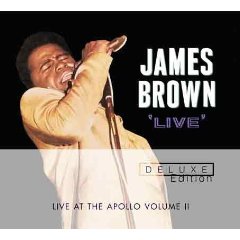| Live at the Apollo, Volume II | ||||
|---|---|---|---|---|
 Cover of the 2001 Deluxe Edition | ||||
| Live album by | ||||
| Released | August 1968 | |||
| Recorded | June 24–25, 1967 [1] | |||
| Venue | Apollo Theater (New York City, New York) [1] | |||
| Genre | ||||
| Label | King (original LP) 1022 Polydor (Deluxe Edition) 549 884-2 | |||
| Producer | James Brown | |||
| James Brown live albums chronology | ||||
| ||||
| Singles from Live at the Apollo, Volume II | ||||
| ||||
| Review scores | |
|---|---|
| Source | Rating |
| AllMusic | |
Live at the Apollo, Volume II is a 1968 live double album by James Brown and The Famous Flames, recorded in 1967 at the Apollo Theater in Harlem. It is a follow-up to Brown's 1963 recording, Live at the Apollo . It is best known for the long medley of "Let Yourself Go", "There Was a Time", and "I Feel All Right", followed by "Cold Sweat", which document the emergence of Brown's funk style. It peaked at No. 32 on the Billboard Top LP's chart. [3] [4] Robert Christgau included the album in his "basic record library" for the 1950s and 1960s. [5]
Contents
On the original 1968 album and its 1987 CD reissue the performances were edited to accommodate the recording medium. A more complete recording of what was captured from the performances was remastered and released on a 2-CD Deluxe Edition in 2001. The Famous Flames, (Bobby Byrd and Bobby Bennett), were credited on the record label and the back cover of the album (although not on the front). [6] [7] But on the original album release, their group name was cut from the live intro, because in between the time of the recording of the album and its actual 1968 release, the group members quit James Brown due to salary disputes, essentially leaving Brown as a solo act. (Famous Flame Lloyd Stallworth had left the group during 1966 for the same reasons). [8] However, years later, on the 2001 Deluxe Edition CD release, the complete introduction by MC Frankie Crocker, including The Famous Flames' name, was restored.
This was the last live album recorded by James Brown & The Famous Flames as a group.[ citation needed ]